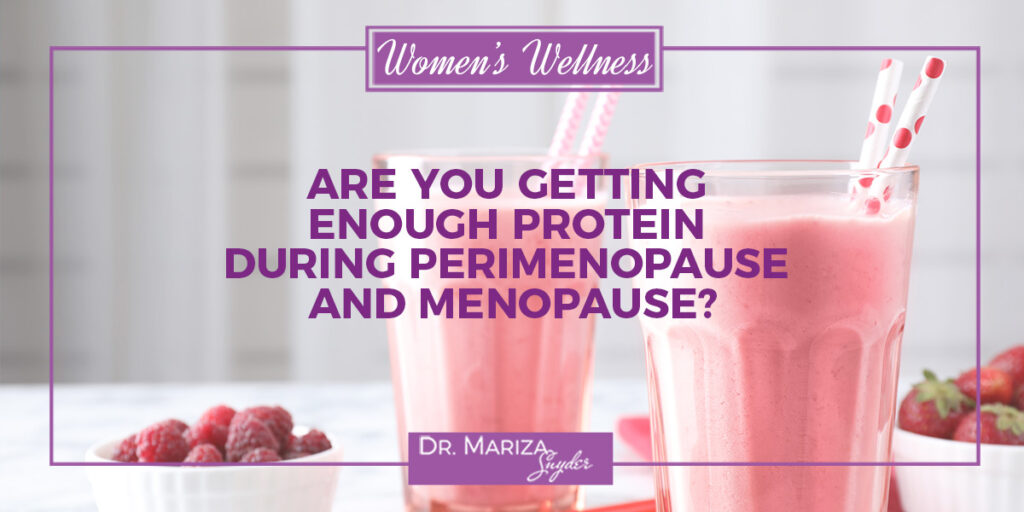Your food choices impact your health and how you care for yourself on a daily basis. One of the most important food choices you can make each day is to consume enough quality protein.
I always stress to my patients that they have to make themselves a priority. During perimenopause and menopause, it’s even more important to make time for yourself and give your body what it needs.
One important way you can take care of yourself during the challenging stages of perimenopause and menopause is to get enough protein in your diet. As you navigate the changes of this time of your life, it’s important to know that the needs of your body are also changing.
It is critical to get enough protein as you age. Adequate protein can benefit your health in numerous and beautiful ways. The macronutrient protein is made up of amino acids, which are the building blocks of a healthy body and provide whole-body benefits.
Protein Helps Protect, Repair, and Strengthen Your Muscles
Muscle mass begins to decrease during perimenopause and continues to shrink during and after menopause. The loss of muscle mass, called sarcopenia, can have devastating effects on a woman’s overall health.
Eating plenty of high-quality protein can help protect your muscles from losing mass. It can also help repair and strengthen your muscles when you combine exercise with a healthy protein-rich diet.
As both men and women age, their need for more quality protein increases. However, the need is even greater for women. According to research studies, menopausal women who consume between 0.8 and 1.2 grams of protein per kg of body weight daily are healthier than those who eat less than 0.8 grams per kg of body weight. (1)
Protein Keeps You Full and Satisfied
Most perimenopausal and menopausal women experience some unwanted weight gain or extra inches around their waist. Losing weight at this stage in your life can be more difficult. Eating enough quality protein can help with weight loss and weight maintenance.
Eating enough protein helps you stay full and energized for longer periods and can support weight and body-fat reduction. (2) Your body takes longer to digest protein than carbohydrates which means you feel full longer and you aren’t as eager to eat between meals.
Feeling full and satisfied naturally leads to consuming fewer calories and to weight loss and maintenance.
Protein Supports Hormone Health
Protein is important for every cell in your body and is used to make your hormones like estrogen, insulin, and more. The type of protein also has an important role in your hormone health. (3)
Some protein sources, like grain-fed beef or other animal products raised with antibiotics and injected with hormone-disrupting chemicals, can wreak havoc on your hormones. However, quality protein sources are vital to healthy hormones.
Consuming adequate amounts of high-quality protein is crucial to keeping your hormones in balance.
Protein Supports Bone Health
Osteoporosis is the condition in which bones weaken and are more vulnerable to fractures. It happens when new bone is not created fast enough to keep up with a bone loss.
It is most common in women ages 50 and older, so perimenopause and menopause women are at the highest risk.
A recent study found that higher protein intakes greatly benefit bone density in mature adults. In that study, higher protein reduced the risk of fracture of the lumbar spine and of hip fractures. (4)
The adequate intake of quality protein helps keep your muscles strong, which in turn, helps keep your bones healthy. Healthy muscle tissue supports healthy bone tissue.
Quality protein is essential for bone health and preventing osteoporosis.
Protein Helps Boost Immune System Function
Your immune system is one of the most complex systems we have in our bodies. We know that good nutrition is good for our immune system and that eating poorly can weaken our immune system. It has also been known for decades that a lack of quality protein in the diet can impair your immune system function.
But only recently have research studies shown amino acids boost the immune response by regulating specific immune system lymphocytes, natural killer cells, macrophages, and increasing the production of antibodies. (5)
Your immune system is made up of amino acids and when the body is sick and fighting infection, it relies on the stores of protein for its immune response.
Quality protein keeps our immune system functioning properly and keeps us healthier.
The Takeaway
Your dietary choices dramatically impact your health – physically, mentally, emotionally, and spiritually – no matter your age. As you go through the stages of perimenopause and menopause it’s even more critical to pay attention to what you eat.
One of the most important choices you can make for your health at this stage of life is to consume enough quality protein. Adequate quality protein can improve your muscle mass and strength, your bone health, hormone health, and immune function.
My delicious Paleo Daily Protein and Pea Daily Protein each provide the highest quality proteins to support your body at all stages of your life.
If you’re following a Paleo diet, try my Paleo Daily Protein, in either vanilla or chocolate. It contains HydroBEEF, which is a highly concentrated pure beef protein that results in easier absorption and assimilation in the body. The beef in this product comes from animals raised in Sweden without hormones or antibodies and is free of any GMO grains, grasses, and/or ensilage.
If you’re avoiding animal products, you should try my Pea Daily Protein. It’s the perfect supplement for a plant-based diet when you’re looking to add more protein to your diet. It is a great-tasting natural pea protein isolate with high levels of efficacy and functionality. It is a true vegan protein with high bioavailability and excellent digestibility.
All-Inclusive Meal Plan Designed for Women in Perimenopause and Menopause
I know how hard it can be to keep track of all the nutrients you need to get on a daily basis. That’s why I’ve included protein at optimal levels in every meal provided in The Essential Oils Menopause Solution!
These delicious, easy meals work perfectly for all of your body’s needs at this stage of your life. Grab your copy here today!
Order The Essential Oils Menopause Solution and Get Over $500 in Bonuses
References:
- Leidy, H. J., Clifton, P. M., Astrup, A., Wycherley, T. P., Westerterp-Plantenga, M. S., Luscombe-Marsh, N. D. & Mattes, R. D. (2015). The role of protein in weight loss and maintenance. The American Journal of Clinical Nutrition, 101(6), 1320S-1329S.
- Halton, T. L., & Hu, F. B. (2004). The effects of high protein diets on thermogenesis, satiety and weight loss: a critical review. Journal of the American College of Nutrition, 23(5), 373-385.
- Gottfried, Sara, M.D., Ferira, Ashely Jordan, Ph.D, RDN. (2021). The 10 Best Types of Protein For Hormone Balance. Mindbodygreen.com (Web).
- Protein’s Role in Bone Health – American Society for Nutrition. (2021). Nutrition.org. (Web).
- Li, Peng, Yin, Yu-Long, Li, Defa, Woo Kim, Sung, Wu, Guoyao. (2017). Amino acids and immune function. National Institute of Health, Pub Med. nih.gov. (Web).



No comments yet.